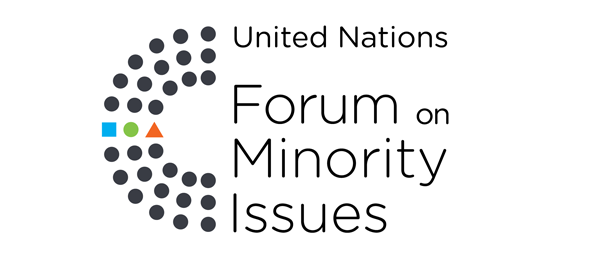Video Submission for the UN Forum on Minority Issues
13th Session, Geneva, 19 and 20 November 2020
Organization: United Macedonian Diaspora (UMD)
Presenter: Metodija A. Koloski, President
Item 4: Regulation of online hate speech: the role and responsibility of intergovernmental organizations, States, internet companies, and social media platforms
Thank you to the UN Special Rapporteur on minority issues for the invitation.
Madame Chair, Each and every one of us attending this forum has a role and responsibility to combat online hate speech in all its forms.
Recently, the United Macedonian Diaspora became a founding member of the Voices of Internet Freedom Coalition, which recognizes that internet freedom is the next frontier of human rights work. Oppressed people around the world want to use digital tools to break through information censorship, connect with others, and get accurate and unbiased news, that their governments may deny.
We joined the Coalition because of systematic censorship and discrimination of the #Macedonian minority in #Bulgaria and #Greece. They have little or no platforms to express their challenges via regular media such as TV, radio, or print. Social media has been one of the most effective ways to communicate. However, this is often at the expense of being attacked nonstop by bots and trolls. Government and non-governmental institutions, civil society, internet companies, and social media platforms have a duty to create a safe space for human rights activists, particularly in countries with discriminatory policies towards minorities.
In Bulgaria, just in the past few weeks, we have seen senior officials such as Bulgarian Deputy Prime Minister Krasimir Karakachanov publicly claim there is no Macedonian minority in Bulgaria, and their Foreign Minister Ekaterina Zaharieva stating Macedonians are nothing but Western Bulgarians. Hatred on social media against the Macedonian minority has been rampantly instigated by Karakachanov’s political party, a neo-Nazi-style party that regularly propagates hatred against Macedonians, Roma, Turks, and other minorities in Bulgaria.
Online hate speech is not merely created in a social media void – it stems from hateful and discriminatory policies propagated by States. These policies legitimize and provide credibility for the marginalization of minorities in everyday life settings and hence in online spheres. The effectiveness of social media platforms in addressing online hate speech and combating the serious ramifications of such dialogue is evidently intertwined with the willingness of States like Greece and Bulgaria to take positive steps to protect the rights of their Macedonian minorities. With the ever-expanding prevalence of social media, it is more than time for the leadership in both countries to stop questioning whether there is a Macedonian minority, which clearly there is, and work towards respect for equal human rights. We need to see a cultural shift, which has not readily occurred in either of these States – it is incumbent on the United Nations to exert the appropriate pressure to ensure these countries foster cohesion between ethnic groups and observe their obligations under international law.
Thank you for your time Madame Chair.
Written Statement For the Record:
UN Forum on Minority Issues
13th Session, Geneva, 19 and 20 November 2020
Organization: United Macedonian Diaspora (UMD)
Presenter: Metodija A. Koloski, President
Item 4: Regulation of online hate speech: the role and responsibility of intergovernmental organizations, States, internet companies, and social media platforms
Thank you to the UN Special Rapporteur on minority issues, Dr. Fernand de Varennes for the invitation, and to the UN Forum on Minority Issues Chair Dr. Natalie Alkiviadou from Cyprus for ensuring an easy-go flow of the forum.
Each and every one of us attending this forum has a role and responsibility to combat online hate speech in all its forms. Since the COVID-19 pandemic, we have seen an increased level of participation on social media platforms, largely due to more people being at home for extended periods of time and taking out their frustrations on society, government, and minorities.
Recently, the United Macedonian Diaspora became a founding member of the Voices of Internet Freedom Coalition, which recognizes that internet freedom is the next frontier of human rights work. The internet is a platform that is potentially able to facilitate the free flow of information globally and in an uninhibited way. Oppressed people around the world want to use digital tools to break through information censorship, connect with others, and get accurate and unbiased news, that their governments may deny.
We joined this Coalition because of systematic censorship and discrimination of the Macedonian minority in Bulgaria and Greece. They have little or no platforms to express their challenges via regular media such as TV, radio, or print. Social media has been one of the most effective ways to communicate and get the word out about discrimination. However, this is often at the expense of being attacked incessantly by bots and trolls. Intergovernmental organizations, States, internet companies and social media platforms have a duty to create a safe space for human rights activists, particularly in countries with discriminatory policies towards minorities.
In Bulgaria, just in the past few weeks, we have seen senior officials such as Bulgarian Deputy Prime Minister Krasimir Karakachanov publicly claim there is no Macedonian minority in Bulgaria, and their Foreign Minister Ekaterina Zaharieva stating Macedonians are nothing but Western Bulgarians. Hatred on social media against the Macedonian minority has been rampantly instigated by Karakachanov’s political party, a neo-Nazi-style party that regularly propagates hatred against Macedonians, Roma, Turks, and other minorities in Bulgaria.
Bulgaria and Greece continue to deny important human rights to their Macedonian minorities, including the right to freedom of association and assembly, and thus in turn, their religious rights and internet freedoms. The Macedonian minority has often been neglected and forgotten by the international community, a tendency stemming from the systemic and ongoing denial that the Macedonian minority exists in these two countries.
It is time both Bulgaria’s and Greece’s leadership stop questioning whether there is a Macedonian minority and work to give them equal human rights under the law. By not recognizing their Macedonian minorities, they prohibit them from establishing their own political parties, religious institutions, and cultural associations.
The following are just some of the challenges facing the Macedonian minorities in Bulgaria and Greece, whose human rights violations have been well-documented within the United Nations.
● Greece and Bulgaria have been found to violate human and minority rights by the ECtHR, for example, Greece was in violation of Article 11 of the European Covenant of Human Rights, where a Macedonian cultural association was denied registration on the basis that it promoted the idea that a Macedonian minority exists in Greece. Bulgaria was also found in violation of this Article 11, as the Bulgarian government denied the registration of OMO Ilinden, an ethnic Macedonian political party.
● Greece and Bulgaria’s denialist stance has resulted in Macedonian minorities being deprived of their freedom of religion. There have also been instances of physical violence. For example, Archimandrite Nikodim Tsarknias, a leader of the Macedonian Orthodox Christian community in Greece, was expelled in 1992 from the Greek Orthodox Church after having declared his Macedonian identity and speaking Macedonian with his parishioners. Being accused and convicted by Greek courts on false charges, beaten by Greek border officials, choked and harassed by hospital staff, suffering physical assaults which left him with a brain hemorrhage; Archimandrite Tsarknias has attracted the attention of Amnesty International.
● Archimandrite Tsarknias has been able to establish a Macedonian Orthodox Church, however, the Greek government continues to halt its registration and licensing despite the submission of relevant documents and a petition to the Greek Ombudsman in February 2020. Frustratingly, a response from the Ministry of Education and Religion is 3 years pending. Thus, although there exist relevant laws and regulations, the Greek government refuses to apply its own laws, creating blatant discrimination.
● The Greek Orthodox Church denies baptism to those with Macedonian surnames.
● Despite Bulgaria’s vast anti-discrimination laws and policies, and its constitution that guarantees that “the practicing of any religion shall be unrestricted,” Bulgaria continuously restricts the religious freedoms of its minorities. The Bulgarian Orthodox Church does not recognize the Macedonian Orthodox Church as a canonical church, but rather as schismatic, illegitimate, and created for political reasons.
● The Bulgarian denialist stance on both the Macedonian minority and the Macedonian Orthodox Church prohibits Macedonians from enjoying religious freedom and building Macedonian Orthodox churches in Bulgaria.
Online hate speech is not merely created in a social media void – it stems from hateful and discriminatory policies propagated by States. These policies legitimize and provide credibility for the marginalization of minorities in everyday life settings and hence in online spheres. The effectiveness of social media platforms in addressing online hate speech and combating the serious ramifications of such dialogue is evidently intertwined with the willingness of States like Greece and Bulgaria to take positive steps to protect the rights of their Macedonian minorities. With the ever-expanding prevalence of social media, it is more than time for the leadership in both countries to stop questioning whether there is a Macedonian minority, which clearly there is, and work towards respect for equal human rights. We need to see a cultural shift, which has not readily occurred in either of these States – it is incumbent on the United Nations to exert the appropriate pressure to ensure these countries foster cohesion between ethnic groups and observe their obligations under international law.

